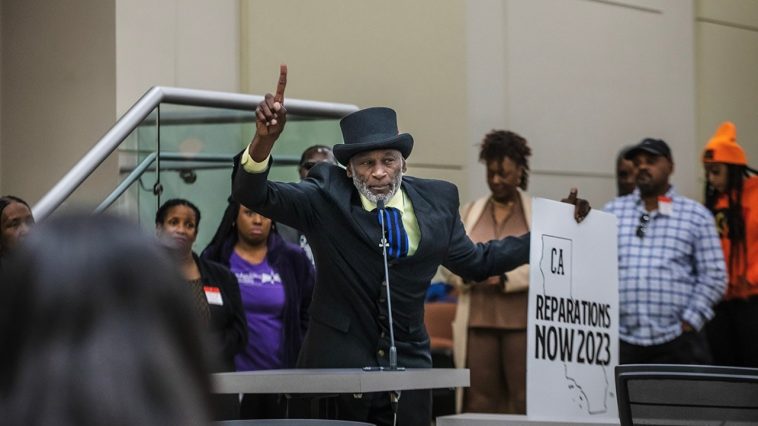LISTEN HERE:
There may soon be a historic vote in California’s legislature on a recent recommendation from the California Reparations Task Force. The panel has formally proposed that payments of up to $1.2 million be provided to each eligible Black resident in the state. This momentous decision came after a public meeting took place in Oakland, California, during which the task force voted on the final recommendations to present to the state’s legislators. In addition to the financial compensation, the nine-member panel urged the state to extend a formal apology to its Black residents.
Representative Barbara Lee, a Democrat from California, highlighted the moral justification for reparations, stating that they are not only morally justifiable, but they also have the potential to rectify long-standing racial disparities and inequalities. The panel’s proposal outlines payments based on the different types of historical discrimination experienced by Black residents in California. The intention is to compensate those who faced various forms of injustice throughout history.
As an example, Black residents affected by redlining practices by banks would receive $3,366 for each year they lived in California between the early 1930s and late 1970s, which could amount to a maximum of $148,099. Furthermore, Black residents could be eligible for about $2,352 in compensation for over-policing and mass incarceration experienced while living in California from 1970 to 2020. This part of the payment plan could potentially amount to up to $115,260.
JUST IN: ?? California panel approves reparations payments of up to $1.2 million for black residents.
— Watcher.Guru (@WatcherGuru) May 7, 2023
Taking into account these and other compensation components in the proposal, a 71-year-old Black Californian who has lived within the state their entire life could receive a total of roughly $1.2 million. This estimation has been reinforced by an analysis from the New York Times. It is essential to note that the panel’s vote during Saturday’s meeting only encompassed recommendations for the state legislature and does not currently possess legal authority.
During the public meeting, some vocal Black residents expressed their opposition to the proposed compensation amounts, demanding larger payments instead. Reverend Tony Pierce, an activist present at the meeting, referred to the infamous ’40 acres and a mule’ promise made to former slaves and suggested that the figure should reflect the worth of those resources back when the promise was made.
Rev. Pierce passionately stated, ‘You know that the numbers should be equivocal to what an acre was back then. We were given 40, OK? We were given 40 acres. You know what that number is. You keep trying to talk about now, yet you research back to slavery and you say nothing about slavery, nothing.’ According to Pierce, an equivalent figure for each African American at present day would be around $200 million.
A majority of individuals who attended and spoke up at Saturday’s meeting expressed their support for reparations as a restitution method for historical discrimination. However, the gathering was not without its conflicts and emotional outbursts, as arguments erupted and attendees often interrupted one another.
Reparations Proposal At California Assembly Task Force Is:
$200 million to every Black person.
Yes that’s right, they want 200 million each ??#Reparations pic.twitter.com/CWtlvCwX95— Ashlea Simon (@AshleaSimonBF) May 7, 2023
Kamilah Moore, the chair of the task force, had to call security multiple times to remove individuals who refused to follow convention etiquette. The chaotic and emotionally charged nature of the meeting demonstrated the complexities and sensitivities surrounding the topic of reparations.
A significant point in the draft recommendation was the acknowledgment that California became a part of the United States as a free state in 1850. However, the task force also recognized that laws guaranteeing freedom for slaves were not passed at that time.
The recommendation continued to state that the Fugitive Slave Act – which charged the apprehension and return of escaped slaves – remained enforced in California for a decade following emancipation. This fact emphasizes the need for reparations as a means of addressing the historical racial injustices that have persisted within the state.
The reparations debate is inherently a matter of principle for some members of the conservative population. While acknowledging the importance of such discussions and the undeniable history of discrimination, some might question the feasibility of such a large-scale financial effort and its ultimate impact on achieving meaningful change.
Concerns may arise over the potential use of taxpayer funds to cover reparations payments, as many conservatives prioritize fiscal responsibility and may question the overall benefit of this program. For those who express skepticism about the reparations proposal, alternative methods of addressing historical and current racial inequalities might be preferred.
For many conservative individuals, an emphasis might be placed on empowering Black communities through education, economic opportunity, and entrepreneurship rather than implementing a large-scale reparations program. This approach can potentially create lasting, sustainable change within communities and foster greater self-sufficiency.
However, it remains crucial to acknowledge the role reparations could play in addressing historical injustices and promoting healing within communities. While fiscal responsibility is a priority for many conservatives, finding a balance between economic prudence and the moral obligation to make amends for past wrongs is essential.
Only time will tell how California’s legislature will respond to the California Reparations Task Force’s recommendations, but one thing is for certain: the ongoing debate surrounding reparations highlights the ever-present struggle for justice and equality in America. The conversation around reparations and the pursuit of racial equity will likely persist, with both sides offering alternative solutions and perspectives.


